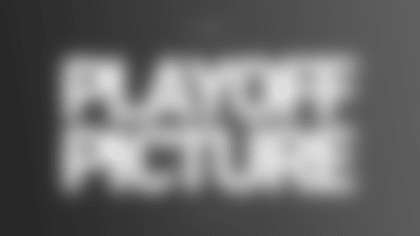JACKSONVILLE – The calendar has turned, and the feeling is real.
Remember the first day of school? That was Tuesday at EverBank Field, only with big paychecks – and for the Jaguars this offseason, bigger hopes and aspirations.
It was a day for veterans seeing old friends, and a day for seven unrestricted free agents – more on them in a few paragraphs – to start getting acclimated to a team that needs big contributions from a group that signed with so much excitement early last month.
Yes, this week is the beginning of the offseason program.
What that means is players can strengthen and condition for two weeks, then work with coaches on the field in individual work for three weeks after that. The ensuing four weeks are what people traditionally consider the offseason program – the nine organized team activities and the three-day veteran minicamp.
And remember: it's all voluntary except for the three-day minicamp.
That last part – the OTA and minicamp part – is the "football-practice" part: 7-on-7, 9-on-7 and 11-on-11 drills. There's no contact, but that's "football" stuff.
For now, it's conditioning, working out and getting acclimated, which means it's the first time the team that will eventually become the 2016 Jaguars is together as a team.
As we mentioned earlier, the 2016 free-agency class is expected to be a crucial part of that team.
The secondary, the defensive line, the offensive line, the running game … all must improve next season, and all were addressed in free agency.
A few weeks ago, we examined five major storylines involving familiar faces as the Jaguars prepare for 2016. Today, as the offseason program begins, we'll examine five major storylines involving one of the most high-profile – and important – free-agency classes in franchise history:
1)Malik Jackson must be really good.There's no other way to say it. While it's impossible to be "worth" $41 million guaranteed, the Jaguars need the veteran defensive tackle – who signed from Denver as an unrestricted free agent – to be a force. A three-technique defensive tackle, Jackson also can line up at strong-side end and can move around the line in passing situations. He's not "technically" a pass rusher, but he is expected to play in rotations with veteran tackle Sen'Derrick Marks and end Dante Fowler Jr. – and help improve what last season was a struggling pass rush. He also is expected to be disruptive against the run – and make players around him better. The Jaguars are asking a lot of him. No question. If the defense is to make the necessary strides, he must deliver.
Images as players arrived at EverBank Field for the first day of offseason voluntary workouts.









2)Tashaun Gipson needs to turn free safety into a strength.A long-running storyline of the Gus Bradley/Dave Caldwell era has been the need for a front-line free safety. Enter Tashaun Gipson, an unrestricted free agent from the Browns and the regime's boldest move at the position to date. Gipson led the AFC in interceptions in 2013 and 2014, and has potential to improve the position's ability to cover the back end sideline to sideline. The hope also is that Gipson's presence has the secondary effect of allowing strong safety Johnathan Cyprien to focus on playing in the box near the line of scrimmage, potentially improving two positions.
3)Prince must be kingly.Signing cornerback Prince Amukamara to a one-year, "prove-it" contract in March didn't get the attention as signing Jackson and Gipson, but it became much more important recently. That's when the NFL announced that Jaguars cornerback Aaron Colvin will be suspended the first four games of the 2016 regular-season for violating the league's performance-enhancing substances policy. Even before Colvin's suspension, Amukamara was expected to start on the outside opposite Davon House. Injuries limited Amukamara's availability in five seasons with the New York Giants, but he's a former first-round selection and has played like it when healthy. If he can do that next season, he and Gipson could mean a vastly improved secondary.
4)Two heads must really be better than one.Despite last season's improvement, the offense struggled in a few key areas. One such area, the running game, was addressed quickly in free agency with the signing of former Jets running back Chris Ivory. A Pro Bowl selection and 1,000-yard rusher last season, Ivory is expected to help in short-yardage situations, but Ivory in no way is just a slam-bam power runner. He likely will share time and carries with second-year veteran T.J. Yeldon. The Jaguars finished 24th in the NFL in rushing last season, and with quarterback Blake Bortles being very effective as a play-action passer, the running game must improve for this offense to be efficient.
5)The front must be fortified.We saved this for last, but make no mistake: improving and solidifying the offensive line is a critical offseason storyline. Though the offseason moves in this area were significant, the Jaguars will have to wait to see exactly how they take shape. Kelvin Beachum, signed as an unrestricted free agent from Pittsburgh, is expected to compete with Luke Joeckel at left tackle – a competition that won't truly begin until training camp when Beachum is expected to return from the torn anterior cruciate ligament that kept him out the last 10 regular season games last season. With the Jaguars possibly moving Brandon Linder from guard to center, a line of Jermey Parnell at right tackle, A.J. Cann at right guard, Linder at center and Joeckel/Beachum at guard and/or tackle is a possibility. Beachum's addition makes the Jaguars line better on paper, but it must translate to the field. The 51 sacks allowed last season, though an improvement, were too many – and improved run blocking is as important as the aforementioned addition of Ivory. It's been too long since the line was a strength. Progress here must be made.














